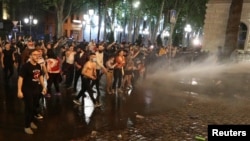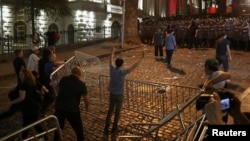Georgian security forces used water cannon and tear gas against protesters outside parliament late on Tuesday, sharply escalating a crackdown after lawmakers debated a "foreign agents" bill, which is viewed by the opposition and Western nations as authoritarian and Russian-inspired.
Reuters eyewitnesses saw some police officers physically attack protesters, who threw eggs and bottles at them, before using tear gas and water cannon to force demonstrators from the area outside the Soviet-built parliament building.
Earlier, riot police used pepper spray and batons to clear some protesters who were trying to prevent lawmakers from leaving the back entrance of parliament. Some protesters shouted "Slaves" and "Russians" at police.
The bill has deepened divisions in the deeply polarized southern Caucasus country, setting the ruling Georgian Dream Party against a protest movement backed by opposition groups, civil society, celebrities and Georgia's figurehead president.
Parliament, which is controlled by the Georgian Dream and its allies, is likely to approve the bill, which must pass two more readings before becoming law. Lawmakers ended Tuesday's session without a vote, and the debate will resume on Wednesday.
The bill would require organizations receiving more than 20% of their funding from abroad to register as "foreign agents."
Georgian critics have labeled the bill "the Russian law," comparing it to Moscow's "foreign agent" legislation, which has been used to crack down on dissent there.
Russia is disliked by many Georgians for its support of the breakaway regions of Abkhazia and South Ossetia. Georgia lost a brief war with Russia in 2008.
The United States, Britain and the European Union, which granted Georgia candidate status in December, have criticized the bill. EU officials have said it could halt Georgia's progress toward integration with the bloc.
'Prolonging the inevitable’
Tina Khidasheli, who served as Georgian defense minister in a Georgian Dream-led government in 2015-2016, attended Tuesday's protest against her former government colleagues and said she expected the demonstrators to win eventually.
"The government is just prolonging the inevitable. We might have serious problems, but at the end of the day, the people will go home with victory," she told Reuters.
Thousands of anti-government demonstrators have shut down Tbilisi's central streets on a nightly basis since parliament approved the bill's first reading on April 17.
On Monday, a government-organized rally in support of the bill was attended by tens of thousands of people, many of whom had been bussed in from provincial towns by the ruling party.
At that rally, former Prime Minister Bidzina Ivanishvili, a billionaire who founded Georgian Dream, harshly criticized the West and hinted at a post-election crackdown on the opposition.
Ivanishvili told attendees that a "global party of war" had hijacked the EU and NATO and that it was bent on using those institutions to undermine Georgian sovereignty.
Ivanishvili, who says he wants Georgia to join the EU, said the foreign agent law would bolster national sovereignty, and he suggested that the country's pro-Western opposition was controlled by foreign intelligence services via grants to NGOs.
He added that after elections due by October, Georgia's opposition, which is dominated by the United National Movement Party of former President Mikheil Saakashvili, would face "the harsh political and legal judgment it deserves."






